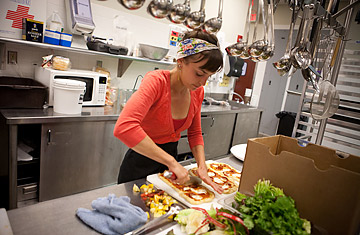
Casey Bilyeu from the Underground Food Collective prepares a healthy lunch at an orientation for FoodCorps members, who begin their year of service this week
As a member of both the Hopi and Pima tribes of Arizona, David Pecusa is more than familiar with the ills of the American food system. The Hopi and Pima, like many other Native American tribes, suffer from dangerously high levels of obesity, higher than Americans nationally — and it's not like the rest of the population is in great shape. The possible causes are many — genetics, stress, poverty — but there's little doubt that one of the biggest problems is simply food. Native Americans who live on reservations often lack access to fresh, wholesome food, while at the same time they've lost connection to their own healthier traditional diets. "Hopi people call themselves the 'farmers of the desert,'" says Pecusa. "Growing food and living off the land is who we are as a Hopi people, and if we don't do this anymore we can't call ourselves Hopi anymore."
That's something Pecusa is trying to change — and he's not alone. Pecusa is one of 50 members of the inaugural cohort of the FoodCorps — a new national service organization that aims to fight obesity and diet-related disease through promoting school gardens and farm-to-school programs. A partner of the AmeriCorps service program — which annually sends more than 85,000 Americans into volunteer work for at least a year — FoodCorps will cast its 50 fellows to host sites in 10 states, like seeds for a better American food system. "There's a lot of passion out there from folks who want to serve," says Debra Eschmeyer, the co-founder of FoodCorps and its program director. "This is a chance for them to share and a chance for them to learn."
I've written before that the modern sustainable-food movement has more energy and momentum than the traditional environmental movement has been able to generate in recent years. FoodCorps is just one more example of that success: 1,229 people applied for just 50 slots — which, as the irrepressible Eschmeyer notes, makes FoodCorps more competitive than Harvard or Teach for America. "There were excellent people out there waiting for this," says Eschmeyer.
Among those who made the cut is Nora Saks, a Maryland native who has worked in organic farming for the past few years. Already an AmeriCorps veteran, Saks says she was waiting for a similar opportunity in the food movement, and jumped when she heard about FoodCorps. All 50 FoodCorps fellows met last week for several days of training — appropriately, at the Wisconsin State Fair in Milwaukee — and Saks says that what excited her the most was the chance to meet other people as committed to changing the American food system as she was. "I've been growing food and learning about farming for seven years now," she says. "All that time I felt almost like I was hoarding that knowledge, but with FoodCorps there's a chance to share with people and learn from them."
Saks and her fellow FoodCorps members begin their year of service this week, working at sites like the Michigan Land Use Institute, the Rippling Waters Organic Farm in Maine and the Johns Hopkins Center for American Indian Health in Arizona. Obviously, the program is still small — just a tiny fraction of the tens of thousands of young Americans who work with AmeriCorps each year. A tight fiscal environment hasn't made it any easier to get the program off the ground — much of the funding has come from private donors, including the W.K. Kellogg Foundation and Whole Foods' Whole Kids Foundation.
But the potential to grow is there — and not just because FoodCorps turned away so many applicants. Whatever your politics, it's clear that America has a food problem, with the number of obese children tripling over the past 30 years, and the cost of weight-related health problems expected to reach $344 billion by 2018. Programs that help improve access to healthy food — a key part of the FoodCorps mission — remain one of the best tools we have to reduce the toll from obesity. "I feel like if we can get people excited about growing their own food, that will make a real difference," says Pecusa.
Which, ultimately, is what Pecusa and the other FoodCorps fellows are really aiming for. "This is what I've always wanted to do," he says. "I want to reconnect Native youth with the agriculture they've been missing." The food movement, after all, has always been about more than food. It's about ideals — and 50 very smart young people are about to get the chance to put those ideals into practice.
